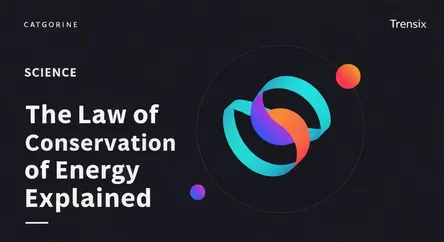Science
The Law of Conservation of Energy Explained

A fundamental principle of physics stating that energy cannot be created or destroyed, only changed from one form to another.
What is it?
The law of conservation of energy is a fundamental principle in physics which states that the total energy of an isolated system remains constant over time. Energy can neither be created nor destroyed; it can only be transformed or transferred from one form to another. For instance, when a pendulum swings, its energy continuously converts between potential energy (at the top of its swing) and kinetic energy (at the bottom). This principle is also formulated as the first law of thermodynamics. Modern physics extends this concept to the conservation of mass-energy, as established by Einstein's equation, E=mc², which shows that mass and energy are interconvertible.
Why is it trending?
This law is a cornerstone of contemporary science and technology, especially in the push for sustainability. It is central to developing renewable energy sources like solar panels, which convert light into electricity, and wind turbines, which turn kinetic energy into electrical power. Engineers apply this principle to create more energy-efficient technologies, such as regenerative braking in electric vehicles that captures kinetic energy to recharge the battery. As global concerns over climate change and energy consumption grow, this fundamental law guides innovation in reducing waste and creating a more sustainable future, making it a perpetually relevant topic.
How does it affect people?
The law of conservation of energy governs numerous aspects of daily life. The chemical energy from the food we eat is converted into kinetic energy for movement and thermal energy to keep us warm. In our homes, appliances convert electrical energy into other forms like light, heat, or sound. Power plants operate on this principle, transforming potential energy from water or chemical energy from fuel into the electricity that powers communities. Understanding this law helps people make informed decisions about energy use, underpinning the design of efficient cars and appliances that save money and reduce environmental impact.